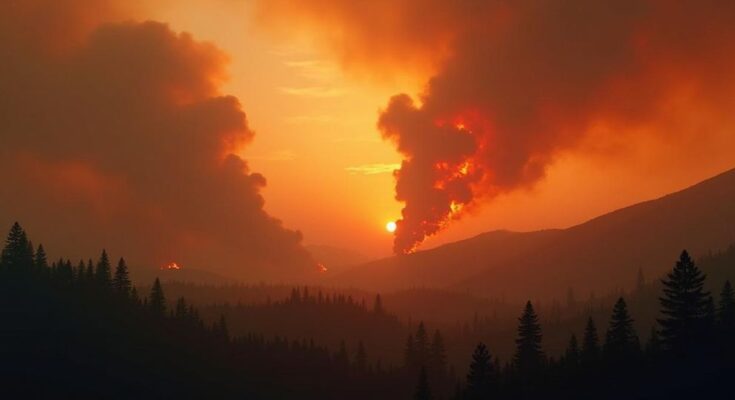Recent wildfires in South America, particularly in the Amazon rainforest, have caused significant environmental and health issues, impacting air quality and local livelihoods. The crisis is driven by human activities and exacerbated by climate change and drought conditions linked to the El Niño phenomenon. Authorities and health professionals are calling for urgent action to mitigate the effects of these destructive fires and preserve the planet.
The heavens that once radiated blue above Rondônia, a significant portion of the Amazon rainforest in Brazil, have been shrouded in smoke due to unprecedented wildfires primarily driven by human actions. As vast areas of South America succumb to flames, visibility has decreased substantially, affecting daily life, including flight operations and school activities. Dr. Lilian Samara de Melo Lima, a physician in Porto Velho, the capital of Rondônia, reported a marked increase in patients suffering from respiratory issues exacerbated by the acrid smoke invading the region. “These days we can’t even see the other bank of the river,” she lamented. The scale of destruction this year has been alarming, as fires result from traditional land-clearing practices, now intensified by a combination of severe droughts instigated by climate change and the El Niño phenomenon. Erika Berenguer, an expert from Oxford University, emphasized that this crisis extends beyond Brazil, noting a surge in fire activity across neighboring nations, including Colombia and Paraguay. Fires have severely impacted the environment in Paraguay’s Chaco ecosystem and have led to dire consequences for indigenous communities, particularly the Ayoreo, who rely on the land for sustenance. In Peru, the situation is equally dire, with over twenty fatalities reported as wildfires ravage extensive areas. The government has declared states of emergency in various regions, partly attributing the conflagrations to traditional agricultural practices, though experts caution that many blazes are intentionally set to clear land for illegal agriculture. As Christian Rivera, an Ecuadorian paramedic pointed out, he has witnessed devastation like never before in his thirty years of service. Fires have also heavily affected Bolivia, leading to a national disaster declaration as millions of hectares of forest have already been lost. Marilene Penati, the health secretary of Porto Velho, poignantly articulated the sentiment of despair shared by many in the region, stating, “The Earth is sick … the Earth is crying out for help,” further echoing the calls from global leaders and advocates for environmental preservation. The continuous disregard for ecological wellbeing poses a significant threat not only to local inhabitants but to the planet as a whole.
This article centers on the alarming rise in wildfires across South America, particularly affecting the Amazon rainforest in Brazil and extending into Peru, Paraguay, Bolivia, and Ecuador. Climate change, exacerbated by El Niño conditions and human activities such as deforestation and land-clearing for agriculture, is identified as a significant driver behind these wildfires. The detrimental health effects on local populations and indigenous communities are highlighted, as well as the broader implications for environmental sustainability. The article sheds light on the interconnectedness of these challenges across national borders and advocates for immediate global response to combat climate-related disasters.
In summary, South America is experiencing an unprecedented crisis due to wildfires, which are a direct response to human intervention and climate anomalies. The health repercussions for communities in affected areas are severe, sparking urgent calls for recognition and action against environmental destruction. The collective narrative underscores the gravity of the situation, depicting both a humanitarian and ecological emergency that requires an immediate and sustained global response to address the deepening climate crisis. The Earth’s condition reflects a dire need for collective awareness and action.
Original Source: www.theguardian.com




